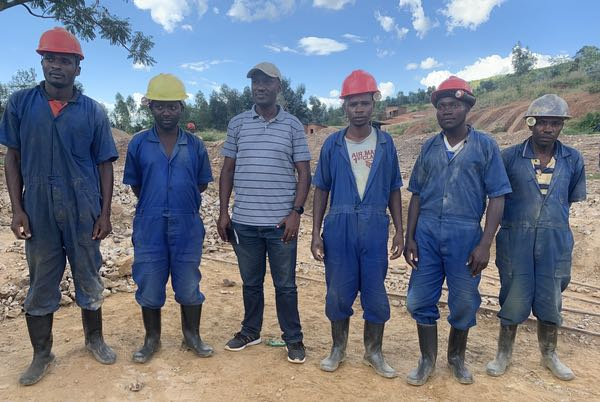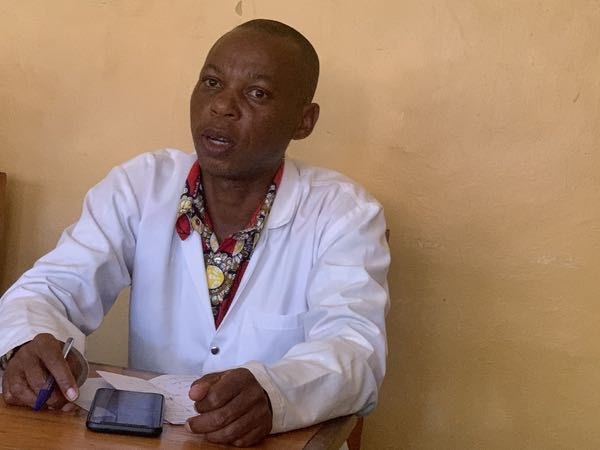[ad_1]

Rwinkwavu miners
Rwinkwavu: “I am one of twenty ladies and young girls, all workers in the Gahengeri mine, Rwinkwavu sector. The total number of workers reaches the figure of two hundred. I have been a widow for 16 years. I have 4 boys that I educate since my husband is decided. When he died, I reflected on what I could do for the survival of my household. I applied for a job as a worker in the mine. I’ve been working there for 14 years. The highest salary I received per month is 280 thousand Frw. Last month I received 78000 Frw. Our salary varies according to the amount of cassiterite collected on the place we reach. Sometimes a miner can have 300,000; 600,000 Frw; or even a million Frw, depending on the wealth of the excavated place. Such a salary for young miners leads to various attractions and enjoyments. Some may drink more alcohol and engage in unprotected sex. Which is the cause of an increase in new infections in Rwinkwavu”, testifies the minor Ahishakiye Ange, 41 years old (the name is anonymous to keep the identity of the minor discreet).
Ahishakiye’s salary was used to pay for her children’s school fees and to feed them. She did not buy land to cultivate. But she got some small livestock (goats, pigs, rabbits) which she sells when she needs money. She never thought of looking for another husband, for fear of being pregnant or venturing into other worries. She admits that if her body tempts her, she will resort to the condom which helps to avoid HIV/AIDS and unwanted pregnancies.
“The condom is available in the vicinity which has a Health Center and a hospital. Some workers want condoms to be distributed in the workplace,” she continues.
The Deputy CEO of the Center in Health who also works in the AIDS service, Dr Anastase Ntawiringira, promises that he will go to the Gahengeri mine to elect a peer educator who will collaborate with the health center in various awareness services against HIV/AIDS: distribution of condoms, organization of voluntary tests, circulation of information on the fight against HIV/AIDS among minors.
Dr. Ntawiringira indicates that 564 infected people follow the ARV regime provided by the Rwinkwavu Health Center. It adds another 50 breastfeeding or pregnant women as part of mother-to-child transmission care.

Dr Anastase Ntawiringira, Deputy CEO of the Rwinkwavu Health Center
“For young people, 197 people are on ARVs, including 8 children under 15, and 18 children aged 15 to 19. Most young people have 100% viral suppression. None of them have more than 200 viral load. We classify the young people in groups and we exchange without the presence of the adults. This allows them to express themselves freely and to say what is important to them, always in the presence of social assistance. Most young people under the age of 15 are dependent on their parents. Because they spend most of the time with them. We discuss with parents the state of health of their children. People on ARVs do not encounter discrimination with other members of the community. They work together in the various activities that are organized. A good sensitization was carried out to achieve this result. As for the pregnancies of young girls under 18, the Rwinkwavu Health Center recorded four pregnancies of this kind last month”, informs the Deputy Director General of the Rwinkwavu Health Center.
It should be explained that viral load is the amount of AIDS virus in one millimeter of blood. When this charge is less than 200, the state of health of the HIV-positive person is good. When it is over 200, there is a problem to be detected, either related to non-compliance with the instructions for taking ARVs or to something else.
“We sit down and discuss with the patient to find other causes. Maybe related to general health. Once a year, we organize a control of the viral load or virology examination. When an HIV-positive person on ARVs keeps appointments, when he takes these ARVs on time and when he keeps appointments for the virology examination, we can hope that he has integrity. So we place our trust in Him. And we can even give him a dose for a year,” explains Dr Dr Ntawiringira.
There are various groups of people who collect their ARVs for six months. Three kinds of drugs (Tenophovir, Ramividine, Dortegravir) form an ARV tablet.
“We can add other drugs on the side. All women generally give birth in the hospital, especially the youngest who are at risk of birth complications. It also helps in monitoring women who are HIV positive. Because, we must avoid the transmission of the virus to the child during birth, ”explains the deputy DG of the Health Center.
Young miner Oscar Kamana, 32, has been mining cassiterite at Gahengeri for nine years. Married with two children, he owns a cow, small livestock, a motorbike and a decent house. His wife runs a fruit and vegetable business. He owes all this wealth to the mine that uses him. He tested negative for AIDS. He wants to maintain this good health with him. He knows that in his vicinity, the drunkenness of young people who are not even minors and the absence of self-control is the cause of the increase in new infections.
“For example, I know five people who take ARVs. And they are not minors. Many people come from various backgrounds to live in Rwinkwavu. Because there is a lot of money in circulation thanks to the cassiterite mine. Different activities can be initiated here. Prostitution is also possible there. It is necessary to check its local level reached. The condom then remains essential for protection,” says Kamana.
For all policies to fight against HIV / AIDS in the district of Kayonza, the Mayor of this district, Jean-Bosco Nyemazi recognizes an increase in new infections among young people.
“Measures have been taken by the district in partnership with its collaborators to reduce new infections. Peer educators and health counselors are ramping up efforts to educate more young people to protect themselves. Justice personnel prosecute male perpetrators of pregnancies among young girls. We are entitled to expect more positive results from the efforts carried out in this sector,” said Mayor Nyemazi. (END)
Related
[ad_2]
Source link



